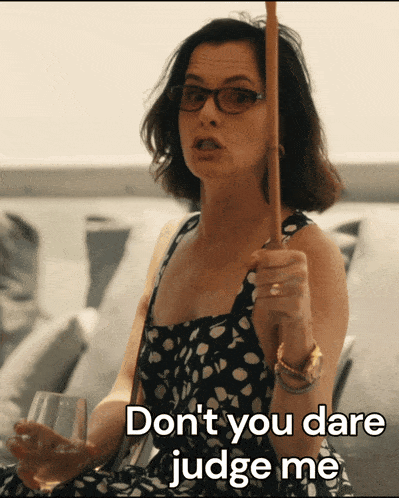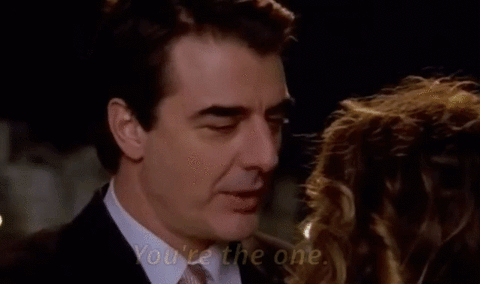The second arrow: when self-abandonment cuts the deepest
Breakups, bullshit jobs & Bewdisammm
As someone whose commitment to meditation is about as robust as Piper Ratliff’s, I cannot claim to be well-versed in Buddhism (or should I say, Bewdisammm).
However,
recently reminded me of the Parable of the Two Arrows. The story goes that when we experience pain—for example from a setback, a loss, or a tragic event—we are shot by the “first arrow”. But on top of this, we self-inflict a “second arrow”: the narrative we create around the first, whether it’s blame, shame, regret, rumination, or catastrophising.It’s a concept I imagine we can all relate to—from dwelling on relationships past or roads not taken, to lying awake at night replaying the time we had our skirt tucked into our knickers in Year 8.
In modern psychology, that second arrow is what we might call trauma: the thought loops or even physical pain our brains and bodies latch onto as coping mechanisms, which keep us perpetually reliving the past.
I wonder if there are also third or even fourth arrows we shoot ourselves with, when we become aware of those narratives or coping mechanisms, but still feel powerless to do something about it.
I see this in my coaching clients (and I feel it myself) when we’re on the path to becoming. Whether you’ve left a relationship or a professional identity behind, it feels daunting to stand in front of that boggy, murky stretch between where you are now and where you want to be. Like there’s a whole shower of arrows raining down on you (or maybe this is just because I’ve been rewatching Lord of the Rings).
I often talk about the role of grief when we’re at these precipices. How important it is to acknowledge the closing of one chapter and the beginning of another, rather than hurtling into the next thing. How we can’t expect to do this without some kind of reckoning—without sadness.
But it can be hard to wrap our heads around this grief. If we hated the job so much, why do we feel so lost without it? If we knew the relationship wasn’t right, why can’t we congratulate ourselves for getting out? I think it has something to do with that second arrow—and specifically, the pain of self-abandonment.
My second arrow
A few years ago, before I met my boyfriend/partner (please can someone invent a new word that sounds neither juvenile nor like we’re in a spaghetti Western/business pitch), I spent six months in a relationship that brought out the worst in me. Thankfully, I found it in me to walk away before too much damage was done, i.e. I before I spent any more of my time and energy on something that was causing me a great deal of stress, heartache, and loneliness.
But there was some damage done. Even though I was lucky enough to meet my boyfriend/partner/joint account co-owner (?) mere weeks after that relationship ended, and to experience so much joy as we fell in love, I still carried a nagging sense of unease.
It was strange. I’d been through breakups where so much of the pain came from the missing and the longing—that devastating, all-consuming grief where it feels like someone has forcibly removed a limb. This wasn’t that—it was a different kind of second arrow.
When the Self speaks
I remember meeting my ex in a pub after we ended things (because there’s always a pub post mortem, right?). As he sat across the table from me, pleading his case for why we should resume our ill-defined relationship, a wave of fierce clarity and unerring calm came over me.
Much to his bewilderment, I delivered a stunning* monologue about all the things I wanted and deserved in a relationship, which I wish a passing member of the sisterhood had recorded for the posterity of all exhausted women everywhere/so I could sell it to Richard Curtis for his next romcom.
What had come over me was, well…me. From somewhere deep within—a pure, knowing, truthful place—the Self had spoken. And as if the cosmos had answered my call, I soon met someone (in that exact same pub!!) who gave me all of the things I had listed to my ex.
But meeting my Self again reminded me of how far we’d grown apart. I realised the source of my unease after the breakup was nothing to do with my ex—it was the pain, shame and guilt that in being with him, I had lost myself.
*At least, in my head. I probably just sounded deranged.
The psychology of self-abandonment
I’m doing some training in relationship coaching and recently attended a talk on the anxious-avoidant attachment trap, delivered by dating and relationships coach, Vicki Pavitt.
If, like me, the relationships of your twenties were sustained by a steady diet of pop psychology and Reddit holes that a) you didn’t really understand or b) served to reinforce the narrative most palatable to you, you’ll be familiar with attachment theory and have some idea about whether your patterns tend towards anxious (hi), avoidant, or secure (or, if you’re especially spicy, anxious-avoidant).
Whenever I revisit these frameworks in coaching training, it humbles me to realise how little I actually know (unsurprisingly, the Tik Toks only scratched the surface).
Vicki spoke in detail about the “trap” that defines dynamics between anxious and avoidant partners (howdy):
On the one hand, we have the anxious partner: she craves closeness, constantly seeks reassurance, and is fearful of being “too much”, lest she put her partner off. Because of this, she’s extremely attuned to her partner’s needs and emotions, and hyper-vigilant about his every mood, Instagram like, or unanswered text.
On the other hand, we have the avoidant partner: he craves autonomy and independence, feels safer keeping his partner at arm’s length, and fears being smothered or overwhelmed. So he’s hyper-vigilant about his space and boundaries, pulling away when things feel too close or committed.
These patterns, drivers and deeper wounds create a push-pull cycle that the Tik Tokers might call “toxic”: the more the anxious person clings and chases, the more the avoidant person shuts down or runs away.
It’s turbulent and frustrating—but also, alluring. Because each partner has qualities the other may unconsciously desire. And deep down, both are motivated by some kind of fear of abandonment.
We’ve all seen this cycle play out—or played it out ourselves—time and time again. Think: Carrie and Big, Taylor and [insert muse of the moment here], Beauty and The Beast.
But for the first time, Vicki named what I’d directly experienced: that what cuts even deeper than the rejection we interpret and internalise from the avoidant’s behaviour, is our own self-abandonment. If the avoidant shoots the first arrow, the second is us neglecting our own self-care to cater to them—and perhaps the third is realising how much we sacrificed once we are out of the dynamic. We wonder: how can I trust myself again? How can I forgive myself?
Of course, self-abandonment isn’t restricted to anxious-avoidant relationship patterns. One might experience it leaving a lovely, secure relationship that nevertheless has met its end. Maybe that relationship held a lot of beauty, love and learning—the sides of you only they brought out, the hobbies, friends, memories and secret languages you shared. Leaving the relationship means leaving (at least temporarily) parts of yourself behind, and that’s painful too.
But this theme of self-abandonment goes way beyond relationships. The more people I coach, the more I think it has to answer for in so many of life’s messes. So, at the risk of jumping around too much (stay with me!), I want to revisit those career-related quandaries I touched on earlier—and explore how self-abandonment might be behind a growing sense of disillusionment many of us feel about work.
Quiet quitting spiralling
I’m aware that I meet a lot of people who are confused about what to do for a living. But my little echo chamber aside, things aren’t looking great out there—from global economic turbulence (thanks Donald) to the astonishingly rapid adoption of AI.
While we don’t yet know how all of this will play out, what I’m seeing as a copywriter is this: marketing budgets are tiny, freelancers are getting lowballed, everyone’s finding it harder to get work, and we’re all trying really hard not to panic.
As a career and life coach, what I’m seeing is this: a growing disappointment with the world of work as we have known it so far, a complete reevaluation of “success” divorced from capitalist metrics, and an increasingly urgent search for some kind of deeper meaning, whether through our jobs or outside of them.
I don’t say any of this to be alarmist or negative (and I think these seeds of doubt have been germinating since the pandemic), but as Ellen Donnelly writes about here, the reality of a white-collar recession seems to be hitting. Hard.
As the rug gets pulled out from under us, I wonder if we are waking up to another anxious-avoidant relationship we’ve been in all along—with work itself.
After all, how many of us have designed our lives—from our sleep cycles, to our meals, to the time we spend with loved ones—around work? How many of us have dutifully lived by company values, while we silenced our own? How many of us have assumed an identity (a “corporate mask”) that we’ve become so accustomed to playing that we forget who we were before, like a method actor who’s gone too deep?
Only to grapple with the possibility that, years of hard work, thousands of pounds in student debt, and a whole lot of compromising ourselves later, it could all be for nothing. To borrow a phrase from David Graeber, author of Bullshit Jobs, it’s a kind of “spiritual violence”—one born of the same self-abandonment we saw play out in those romantic relationships.
So…what happens next?
Coming home to yourself
I don’t want this to sound glib or deny that sometimes, things are just pure shit. None of us know what the future holds. Not everything happens for a reason. But I am a firm believer that the hardest stuff we go through can mould us into stronger, wiser people.
In the same way that we can see a romantic breakup as an opportunity to reconnect with ourselves, I think this is an interesting—if scary—watershed moment in our professional lives. And whether through Buddhist parables or relationship psychology, it’s helpful to name what’s causing us to feel lost—to name the hurt.
Because, whether in love or in work, the growth won’t come from bullishly “moving on”, assigning blame, or (unfortunately) extricating ourselves from capitalism to go and live up a mountain (although if you can, why not).
Instead, I think it begins with recognising where we’ve strayed from ourselves—the parts we’ve forgotten, buried or betrayed—and trying to find our way back.
Food for thought
Stitching yourself back together in times of uncertainty or upheaval is no mean feat. It takes time, acceptance and self-compassion. So may I suggest starting small? For example…
What’s an activity or interest, no matter how small, that used to bring you a lot of joy? How could you reconnect with that?
Here’s me playing pool a few weeks ago—for the first time in about 20 years!
About me + Messy Work
If you’re new here, it’s lovely to have you. I’m Lucia, a writer and coach trying to answer some big questions about whether there’s more to life—and celebrating the mess along the way.
If you’d like me to write to you every couple of weeks (ish), pop your email below and I’ll be in touch.







